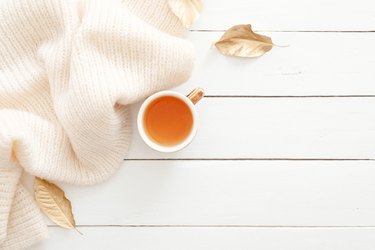
If you think to yourself, "Tea makes me pee," well, you're not alone. According to the Mayo Clinic, there are some foods that may irritate the bladder, including teas. Not only does tea irritate the bladder, but many teas even contain diuretic compounds that are likely to make you urinate more.
Foods That Irritate the Bladder
Video of the Day
Tea is one of a group of foods and drinks that contain a chemical or ingredient known to irritate the bladder. For example, tea often contains caffeine and certain herbal diuretics, both of which may send you to the bathroom more frequently. Other foods that irritate the bladder include:
Video of the Day
- Coffee
- Tomatoes
- Alcohol
- Vinegar
- Acidic fruits and fruit juices
- Chocolate
- Soda and other carbonated beverages
If you find that you need to pee very frequently or are dealing with frequent bladder problems like cystitis, a doctor might suggest that you cut these bladder irritants out of your diet for a set period of time. Your bladder irritation should decrease significantly after a few days. When your bladder isn't as irritated, you may find that you don't need to urinate as often.
A doctor may also suggest that you increase your liquid intake if you find you have symptoms of bladder irritation. While this may seem counterintuitive, if you are dehydrated, the waste products in your urine will be more concentrated. The more concentrated waste in your urinary tract can irritate your bladder and give you the urge to pee more frequently.
Read more: Can Vitamins Cause Frequent Urination?
Caffeine and Urination
Many teas contain caffeine, which is a natural diuretic whose use can lead to more frequent urination. The USDA reports that instant, unsweetened tea contains 26 milligrams of caffeine per 8-ounce cup, whereas brewed black tea contains almost twice as much, with 47 milligrams per cup.
While the caffeine content of teas varies, any amount can make you need to pee more often. According to the Cleveland Clinic, caffeine makes your bladder contract when it is less than full of liquid. Because caffeine makes your bladder contract more often, you will feel these contractions as the need to pee. Cutting caffeine out of your diet or significantly limiting your caffeine consumption, can help reduce the urge to urinate frequently.
Also be aware that teas which state that they contain no caffeine still may contain small amounts, enough that they may irritate your bladder if you are very sensitive to caffeine. Additionally, some teas have other compounds in them that can send you running to the bathroom often.
Natural Herbal Diuretics
Many herbal teas may be decaffeinated, but they can still make you need to pee frequently because many are made from natural diuretics. For example, some teas are brewed from dandelion leaves or nettle, both of which have well-established diuretic properties.
Read more: 10 Everyday Ailments Soothed by Tea
Other Causes of Frequent Urination
While drinking tea can lead to more-frequent urination, other benign causes of increased urination may be the reason you find yourself needing to use the bathroom so often. For example, if you are drinking tea, you may find yourself unintentionally consuming extra liquids. This may cause you to need to relieve yourself more than usual.
Other causes of frequent urination may be signs of a serious health problem. Some health conditions that may cause you to experience excessive urination include:
- Diabetes
- Too much or too little calcium in your body
- Urinary tract infections
- Kidney failure
- Enlarged prostate gland
- Other medications that have diuretic properties
The U.S. National Library of Medicine defines excess urination as 2.5 liters or more per day. However, the specific amount varies, depending on how much liquid you drink each day.
If you're concerned about your urination levels, monitor how much you drink and how often you urinate, along with estimated amounts of urine. Tracking your weight can also you help you determine your fluid output. If you experience high urination over the course of several consecutive days, talk to your doctor.
- U.S. National Library of Medicine: "Urination - Excessive Amount"
- Mayo Clinic: "Bladder Control: Lifestyle Strategies Ease Problems"
- USDA FoodData Central: "Beverages, Tea, Instant, Unsweetened, Prepared With Water"
- USDA FoodData Central: "Beverages, Tea, Black, Brewed, Prepared With Tap Water"
- Cleveland Clinic: "Men, Is Waking Up to Pee Interrupting Your ZZZs? Try These 4 Tips"
- Neurourology and Urodynamics: "Green Tea Drinking Is Inversely Associated With Urinary Incontinence in Middle-Aged and Older Women"
Was this article helpful?
150 Characters Max
0/150
Thank you for sharing!
Thank you for your feedback!